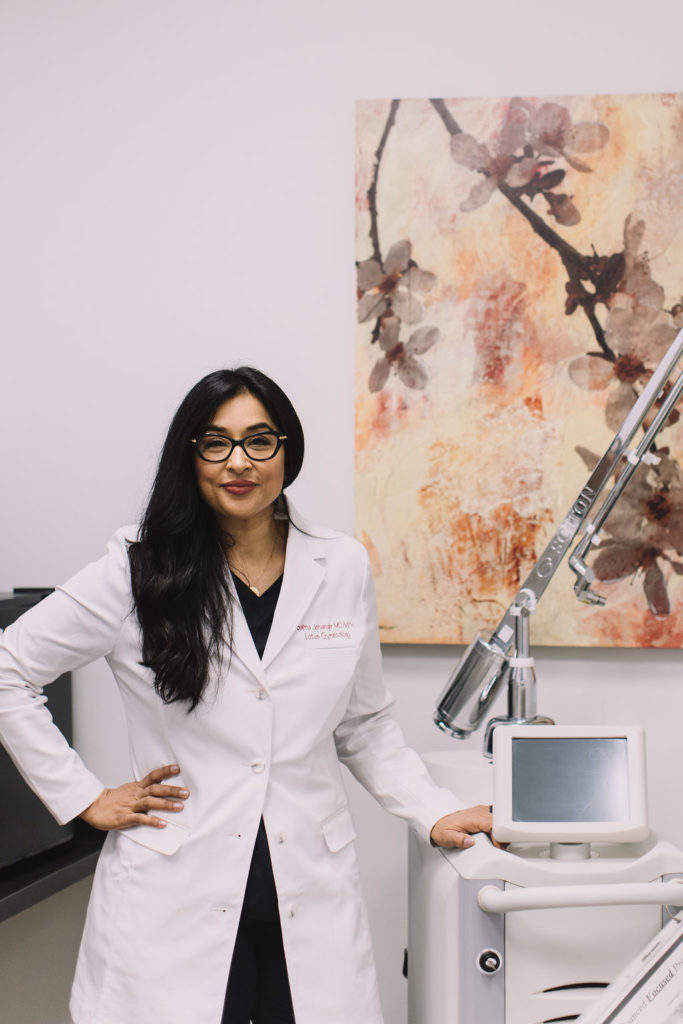Sponsored Content brought to you by Lotus Gynecology
Dr. Saima Jehangir of Lotus Gynecology, Health & Wellness combines both Eastern and Western practices to provide her patients with truly customized treatment plans. Austin Woman sat down with her to ask the sexual health questions that sometimes feel embarrassing to ask.

Q: In your professional opinion, what are the top sexual health concerns for women in their 20s and 30s?
Dr. Jehangir: The 20s and 30s are exciting times in women’s lives. In their 20s many women focus on school and start careers, so finding contraceptive options that work with their lifestyle is a common reason for visits. STD screening is also so important at this time because undiagnosed sexually transmitted diseases can lead to a plethora of issues, including infertility.
Q: COVID-19 may be less of a threat, but STDs haven’t gone anywhere. What advice do you have for women who want to start dating again?
Dr. Jehangir: STDs are obviously a big part of being sexually active. Austin is a very sexually active city. Making sure we are getting screened for sexually transmitted diseases between partners is important. Focusing on how to have fun and be safe! An obvious analogy is condom use is a lot like masking; it needs to be done consistently and properly to prevent disease transmission. I still advise women to have open and frank discussions with their partners about sexual history and expectations. This is not a time to be bashful and take a back seat. Sometimes the questions we don’t ask can really hurt us. Empower yourself to take control of your sexual health.
Q: Human papillomavirus is the most common sexually transmitted infection. Is it possible to get HPV even after being vaccinated?
Dr. Jehangir: Yes. No, vaccine is one 100%. But what we have found is that even if you do contract HPV, it is markedly less likely to progress to cervical cancer, which is the concern with HPV. Yearly Pap tests with HPV screening is the best way to monitory your risk status. There are many different guidelines regarding frequency of screening. Your gynecologist and you should discuss the best screening schedule for you. I still support yearly screening. Early intervention saves lives.
Q: As many as 75% of women have experienced painful sex. What are the causes of that, and how can it be avoided?
Dr. Jehangir: Painful sex has many causes. A careful history is the most important thing to understand when diagnosing painful sex. When did the pain start? Has it always been there? Does it vary from partner to partner? Have you ever had a history of sexual trauma or sexually transmitted diseases? How comfortable are you with your partner? Are you having sex when you are ready, or are you feeling rushed? Is it a lubrication issue? Is it a trust issue? Do you have pelvic floor dysfunction (in other words, do you carry stress in your pelvic floor)? So many questions need to be answered to get to the bottom of the issue. Having a frank discussion with a provider experienced in sexual health as well as a frank discussion with your partner is the place to start.
Q: There are so many different choices for birth control these days. How do you know which one is the best fit?
The best way is to sit with a provider and discuss your expectations of birth control. Holistic health is about addressing the whole patient. What is right for your best friend may not be right for you. Some are great with daily pill taking, others will never remember. Do you want an option you take daily, weekly, monthly or every five years? Are you okay with hormonal contraception, or do you prefer a non-hormonal option? Do you like having a period? Would you prefer a birth control that allows you to be period-free? A careful discussion can usually help us make a joint decision about what is best for you. We are so fortunate to have so many great options.
Q: Many women today are waiting much longer before starting a family. What are the best options to increase fertility if you decide to wait to get pregnant?
Fertility is complex issue. What we do know is that fertility decreases with age. Maintaining a healthy lifestyle and healthy body will help you optimize your chance of pregnancy. One factor that people rarely weigh in on is stress. If you are trying to get pregnant, you must slow down and let your body relax. Acupuncture, meditation and yoga are all stress-reducing activities that can enhance your fertility. Meeting with a gynecologist is a great place to start discussing where you are headed with your family planning.
To learn more or to book an appointment, visit www.lotusobgyn.com.


